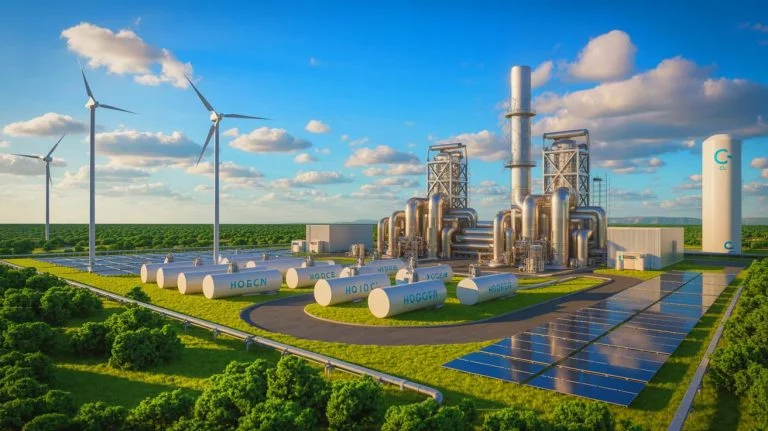| IN A NUTSHELL |
|
As the world grapples with an unprecedented energy crisis, a groundbreaking partnership has emerged between the Abu Dhabi state oil company, Adnoc, and the American giant ExxonMobil. This billion-dollar collaboration aims to revolutionize the energy landscape by focusing on low-carbon solutions. The partnership’s potential impact extends beyond the energy sector, influencing global geopolitics as countries seek alternatives to traditional oil. With a strong commitment to innovation and environmental sustainability, this venture could redefine the future of energy and reshape international alliances in the process.
The Baytown Project: A New Era of Energy Production
The visionary joint venture between Adnoc and ExxonMobil is known as the Baytown Project. This ambitious initiative aims to establish what could be the largest low-emission hydrogen plant in the world. The project is designed to produce up to 1 billion cubic feet per day of blue hydrogen, a form of hydrogen derived from natural gas with integrated CO₂ capture. This process is critical as it significantly reduces carbon emissions compared to traditional hydrogen production methods.
The production of blue hydrogen involves extracting hydrogen not as a liquid but through a refined, technologically advanced process. This clean energy source is poised to power refineries in Europe and energy plants in Japan and Korea. A key goal of the Baytown Project is to capture up to 98% of carbon emissions during production, paving the way for the annual generation of 1 million tons of low-carbon ammonia. This development is significant because ammonia is emerging as a crucial component in the global energy transition.
Challenges and Risks: The Political Landscape
The Baytown Project, though promising, faces political and economic uncertainties. The United Arab Emirates has invested heavily, securing a 35% stake in the project, centered in the heart of Texas. However, the project’s future hinges on the availability of government subsidies for blue hydrogen production in the United States. Despite the absence of clear tax incentives, Adnoc has committed to the project, demonstrating strong confidence in its potential.
ExxonMobil, on the other hand, has expressed concerns, even threatening to withdraw by early 2024 if blue hydrogen remains ineligible for tax credits under preliminary US Treasury guidelines. The evolving political climate, particularly after upcoming American elections, could alter this scenario. The project’s success depends on navigating these complex political dynamics to secure essential support and funding.
Implications for the Global Energy Crisis
Despite uncertainties, the Baytown Project represents a pivotal moment in addressing the global energy crisis. Beyond a commercial alliance, the agreement marks a significant step in the internationalization of transitional energies. Adnoc’s commitment to achieving zero emissions by 2045 underscores the strategic value of this partnership for the United States. Meanwhile, ExxonMobil solidifies its position as a leader in carbon capture technologies and the development of cleaner, sustainable fuels.
The project also promises substantial local benefits, including job creation, economic development, and community support in Texas. If successful, operations are set to begin in 2029, potentially positioning this partnership as the most influential in the world. It could even surpass recent high-profile alliances, such as the one between China and Russia, touted as the most significant of the century.
Looking Ahead: A Transformative Partnership
The collaboration between Adnoc and ExxonMobil signifies not just a business venture but a transformative step towards sustainable energy solutions. With the potential to redefine low-carbon energy production, this project could lead the way in transitioning to cleaner fuel sources. However, its success will depend on political support, technological advancements, and global cooperation.
As the world watches the unfolding of this ambitious initiative, one must ask: Will the Baytown Project become a beacon of innovation and collaboration, leading the charge in solving our energy challenges, or will it succumb to the political and economic hurdles that often accompany such groundbreaking endeavors?
Did you like it? 4.7/5 (23)







This sounds like a big deal! What’s the local reaction to this project in Texas? 🤔
Isn’t blue hydrogen still reliant on fossil fuels? How is it really low-carbon?
Wow, 1 billion ft³ of hydrogen daily? That’s massive!! 🌍
Is this project actually going to help the local economy, or is it all just hype?
Seems like another case of corporate giants playing with land and resources. 😒
Can someone explain what’s “blue hydrogen”? Sounds like a buzzword to me.
Great read! Didn’t know hydrogen could be ‘blue’. Thanks for the insights.
Wait, why does ExxonMobil need government subsidies if this project is so promising?
All this talk of hydrogen… when will we see results? 2029 is a long wait. ⏳
So, does this mean my gas prices will finally go down? 😂
Sounds like a good initiative, but do we have the infrastructure to support this?
I’m skeptical about the environmental impact. How green is this project really?
What are the geopolitical implications of this venture? Could it shift power dynamics?
Thanks for the detailed article. I wasn’t aware of the Baytown Project until now.
Another billion-dollar project… I hope it doesn’t end up being a waste of money. 💰
Thank you for shedding light on the complexities of this project. Very informative!
How is this different from the usual oil drilling projects? 🛢️
Hope this creates jobs for locals and not just for the companies involved. 🤞
Is there any public dissent against this project? Haven’t heard much about protests.
Blue hydrogen? More like blue skies with all the CO₂ capture, right? 😊
Why does the project depend so heavily on political support? Can’t they go it alone?
Sounds like a step forward for sustainable energy, but at what cost?
I’m curious about the environmental safeguards in place for this project. 🌿
Thanks for the article! It’s good to see companies aiming for zero emissions.
How does this partnership compare to others like China-Russia? 🤔
Is there any opposition from environmental groups regarding this project?
I still don’t get why we call it an “invasion”. Isn’t it just business?
Can someone break down how carbon capture works in simple terms?
Interesting read! Can’t wait to see how this unfolds over the next few years.
So, what happens if the U.S. doesn’t provide the necessary subsidies?
Why is ExxonMobil threatening to withdraw? Seems counterproductive. 🤷♂️
Fascinating! But are there any risks of environmental disasters with this project?
Can someone explain how this is an invasion? Feels like a strong word. 🤨
Honestly, this sounds more like an investment than an invasion. Why the drama?
I’m all for innovation, but why does it have to involve foreign companies taking our land?
1 billion cubic feet of hydrogen… But how much is that in gallons? 😅